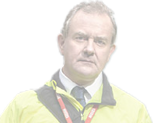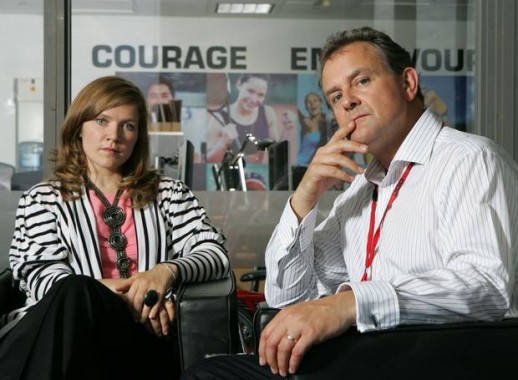Article by James Rampton for The Independent
On a recent edition of Top Gear, Jeremy Clarkson was discussing W1A, BBC2’s new comedy about the ludicrous bureaucratic excesses of a certain type of BBC manager, with its star Hugh Bonneville. Clarkson mentioned that he has not yet done the half-hour New Broadcasting House Health and Safety course on “How to Operate the Building”: “So I still have to be escorted around New Broadcasting House in case I’m confused by a light fitting.”
Clarkson then posed the very pertinent question: “How do you make a fiction about BBC management funnier than what actually happens?” To which the answer is: you make W1A. This sly and subtle new comedy, which begins on Wednesday 19 March, comes with “previous”. It is written and directed by John Morton, the man responsible for Twenty Twelve, the gloriously plausible series about the confederacy of dunces running the (fictional) Olympic Deliverance Commission (ODC).
That august body was headed by Ian Fletcher (Bonneville). He did such a great job of organising the London Olympics that he has now been head-hunted for the role of the BBC’s Head of Values. At the Beeb, he is invited “to think big thoughts”. He also heads up the BBC’s Way Ahead Task Force Group where, David Tennant’s deadpan voiceover tells us, he has “the chance to put the value of values literally on the agenda”.
From the outset, Ian has to deal with the control-freaky Head of Output, the splendidly named Anna Rampton (Sarah Parish). But his job is made even harder by the surprise appointment to the Task Force of Siobhan Sharpe (Jessica Hynes), the PR guru, with her “yah” and “amazeballs” who did so much to hinder Ian at the ODC.
Siobhan is a stranger to the English language but is totally fluent in PR-speak. For instance, when Ian’s team immediately becomes embroiled in a controversy over alleged discrimination against a BBC local news presenter because she’s from the West Country, Siobhan exclaims: “If you don’t triage this now, you’re so gonna be up to your ass in alligators here.”
Visiting the set of W1A at White City in London, I pass the (real-life) BBC reception which is plastered with such slogans as “Values are the standards which people across the BBC share”. Clearly, Morton didn’t have to look far for his comic inspiration.
The cast and crew chat to me in the (mocked-up) Frankie Howerd Room, a meeting place in the midst of a vast open-plan office. Morton has very sharp ears and eyes for the worlds he portrays – so much so that the London Organising Committee of the Olympic Games thought he had a mole feeding him lines for Twenty Twelve. He certainly appeared prescient when, a year and a half before it happened in real life, he wrote a scene about the Olympic countdown clock breaking down.
Bonneville, who has just been wrestling in trademark fashion with Ian’s impossible-to-fold-away fold-away bike, begins by revealing why he thought there was life after the Olympics for this character. “After Twenty Twelve came to an end, I’d flippantly suggested that the ODC team could go and sort out the NHS, the Armed Forces or indeed the BBC. I’m very glad to say that John thought there was a future life at the BBC for such a dynamic leader as Ian.
“As usual with John’s work, life is stranger than fiction. When I read the scripts, I thought, ‘That’s far-fetched. The BBC wouldn’t name meeting rooms after Frankie Howerd and Tommy Cooper.’ But then I came here and saw that they do indeed have a Captain Mainwaring room and a Del Boy room. Art is imitating life.”
The absurdity of so much of the business of management is an area ripe for send-up, too. “It’s about the way bucks get passed and language gets mangled,” reflects Bonneville, best known for his role as the Earl of Grantham in Downton Abbey. “Many of the characters in W1A are people who take themselves way too seriously and are ignorant of the unintentional effect they might be having. John picks up on those tics of language – phrases like ‘I’m not being funny, but …’ – which we all use in our everyday lives to cover up our fear and uncertainty. John has great antennae for the way we try to hide our inadequacies by talking with enormous confidence about something we know nothing about.”
Morton adds that, “The characters in W1A use language to obscure rather than clarify things. A lot of corporate meetings involve people fencing with each other, because in big organisations the most exposing thing is to take a position on anything.”
The programme-makers were anxious to avoid the impression that W1A is only speaking to a select band of media professionals. They maintain that these characters could exist in any mega-bureaucracy. According to the show’s producer Paul Schlesinger, “We tried to tread a line so it doesn’t feel like one big in-joke. John was very mindful to make it universal, so people could relate to it who have no knowledge of what the BBC is really like.”
It is certainly bold of the BBC to let itself be mocked in this way. For all that, the programme-makers are adamant that W1A is not intended as a full-frontal attack on the BBC. Bonneville says that, “Just as Twenty Twelve was not satirising the notion of the Olympics, so W1A is not satirising the notion of the BBC. It’s a strong organisation that allows people to take the mickey out of it in this way. The BBC is one of the most famous brands in the world and makes a huge cultural contribution. Of course, it’s not without its problems. But while we examine its shortcomings, we certainly don’t intend to do a hatchet job. I think that, if anything, W1A will strengthen the reputation of the BBC.”
Parish chimes in: “We’re looking behind the veneer of the BBC, and if we hit a nerve, I’m sorry. Soz, BBC! But in the end, it’s win-win for the Corporation, as people will inevitably say that the BBC are good sports for poking fun at themselves.”
What, then, does Morton hope that audiences will take away from W1A? “Of course, I hope viewers will find it funny. But I also hope they get a sense of how difficult it is to run these big public organisations. One hundred per cent of what Ian is doing is reacting to what’s happened that morning. So he never gets the time to think or to make a difference.
“At the top of any organisation, they have to deal with the same sort of chaos we all face. I remember when Graham Taylor allowed a documentary crew to film him as England football manager. You’d imagine that at the top level they’d know what they’re doing, but the England football team seemed exactly the same as any Sunday afternoon kick-about.”
The writer-director adds that, “It shouldn’t be surprising, because we’re all fallible. You simply can’t control what’s happening around you. It’s like the weather.”
So what is next for Morton? Might we witness the fulfilment of Bonneville’s wish and see Ian Fletcher put in charge of the NHS or the Armed Forces? “I don’t know,” Morton laughs. “My mind is so full of this, I don’t have time to think about anything else. There is no plan. There is no overarching strategy.”
Sound familiar?
‘W1A’ begins on BBC2 at 10pm on Wednesday 19 March. Twenty Twelve starts on new 24/7 channel London Live on 2 April.









